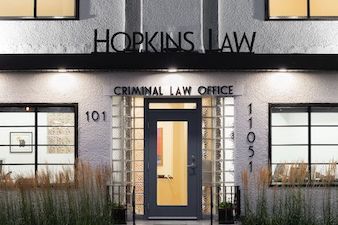Break & Enter
Hopkins Law is a leading defence firm based in Edmonton. We practice criminal law throughout Alberta, and have a great deal of experience with break and enter offences. At Hopkins Law, we find the best solutions available for our clients. We will assess your case and protect your best interests.
Break & Enter Lawyers – Edmonton & surrounding area
587-414-6851 *available 24/7
Hopkins Law – Criminal Lawyers
Edmonton: 11051 97 Street #101


Breaking and entering is a serious crime and a complicated area of law. If you are charged with break and enter, you need a lawyer—you should never try to defend yourself. Criminal trials require specialized knowledge of evidence, procedure and constitutional rights. You will need the help of an experienced legal counsel from the minute you are charged.
You are facing break and enter charges—what can you expect?
There is plenty of room for confusion when dealing with break and enter charges. This area of criminal law is not intuitive. For example, you can be convicted of breaking and entering even if you never broke into anything—it can be enough to simply walk through an open door. The real legal question is what you intended to do after entering a place.
To be convicted of breaking and entering, the Crown needs to prove two things: first, that you entered a place without having a lawful excuse for being there; and second, that you intended to commit a crime inside. There is a catch: proof that you entered into a place without a lawful excuse counts as proof that you intended to commit a crime there. This principle applies unless there is “evidence to the contrary,” making it easier for the Crown to prove its case.
“Home invasion” is the most serious form of breaking and entering. Home invasion happens when you break into a dwelling-house, knowing someone is likely to be there, and make threats of violence to a person or property. Home invasion is extremely serious, and sentences in the range of 6 to 12 years are not uncommon.
If you are convicted of breaking and entering, you may be facing a lengthy jail sentence. Breaking and entering into a dwelling house is one of the few crimes that can attract a life sentence. Your best defence will require careful analysis of the evidence and any potential breaches of your Charter rights. Even if the Crown’s case is strong, your lawyer may be able to negotiate a plea to a lesser offence.
“Being unlawfully in a dwelling house” is a closely related offence—but it is treated much less seriously by the courts. The maximum sentence is 10 years, as opposed to life, and typical sentences are significantly lower. Depending on the facts of your case and the strength of the Crown’s evidence, a plea to being unlawfully in a dwelling house may significantly reduce your risk of jail.
Common Questions:
What counts as “entering” in a breaking and entering charge?
‘Entering’ has a technical legal meaning. You enter a place when any part of your body, or any part of a tool that you use, is put inside a place or an object. ‘Breaking and entering’ happens when either of two things happen: 1) you enter a place using a threat, a trick, or by collusion with someone inside, or 2) you enter a place without a lawful excuse.
I didn’t break into anything—why am I charged with break and enter?
The Criminal Code is drafted broadly so that many actions can count as breaking and entering. If you walk into an open construction site and you have no reason to be there, it is quite possible that you could be arrested for breaking and entering. This does not mean that you would be convicted, but remember that just being found inside a place can count as evidence that you intended to commit a crime there. Your lawyer will need to point to some evidence that you had no intention of committing a crime.
What counts as a “lawful excuse” for entering a place?
There are many possible answers. Obviously, if you own or lease a property, or if you are invited in, you have a lawful excuse for being there. You may also have a lawful excuse if you have a duty to enter a place—for example, if you work as a paramedic or a firefighter and need to enter a place to do your job. There are a number of grey areas: if you think you have a legal reason to enter a place, but you are wrong about the law, your good intentions will not count as an excuse.
Breaking and Entering is a complicated area of law. If you are charged, Hopkins Law will guide you through the court process and cover every base of your defence. You can trust us to give you clear, frank and honest advice. We are your defence.
Break & Enter Lawyers – Edmonton & surrounding area
587-414-6851 *available 24/7
Hopkins Law – Criminal Lawyers
Edmonton: 11051 97 Street #101

Author:
